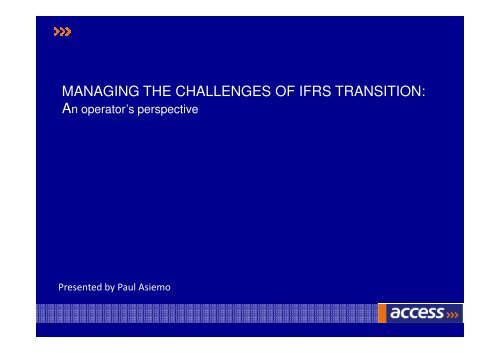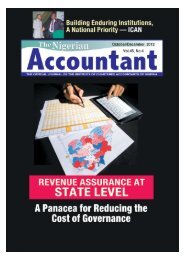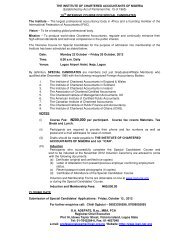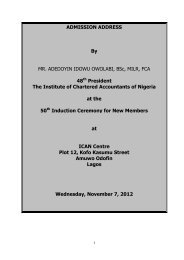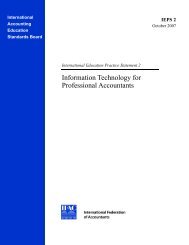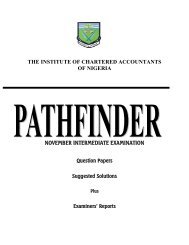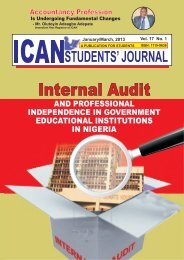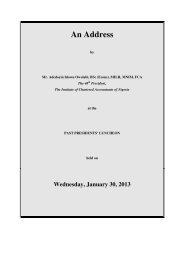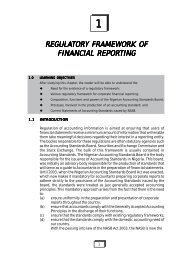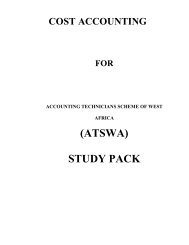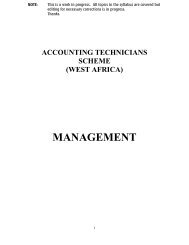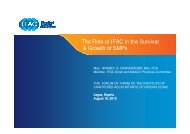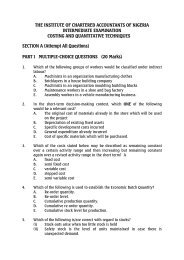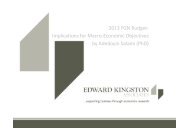Challenges of IFRS Adoption
Challenges of IFRS Adoption
Challenges of IFRS Adoption
- No tags were found...
You also want an ePaper? Increase the reach of your titles
YUMPU automatically turns print PDFs into web optimized ePapers that Google loves.
MANAGING THE CHALLENGES OF <strong>IFRS</strong> TRANSITION:<br />
An operator’s perspective<br />
Presented by Paul Asiemo<br />
1
Presentation Outline<br />
Overview <strong>of</strong> <strong>IFRS</strong>s<br />
Global adoption <strong>of</strong> <strong>IFRS</strong>s<br />
Concerns /Implications<br />
The <strong>IFRS</strong> Clouds (<strong>Challenges</strong>)<br />
Access Bank: Case study –Challenge /Resolution<br />
2
Overview <strong>of</strong> <strong>IFRS</strong>s<br />
<strong>IFRS</strong> is a globally-accepted set <strong>of</strong> accounting standards and interpretations<br />
established by:<br />
International Accounting Standards Board (IASB)<br />
International Financial Reporting Interpretations Committee (IFRIC).<br />
<strong>IFRS</strong> assist preparers <strong>of</strong> financial statements produce and present:<br />
high quality<br />
transparent and,<br />
comparable financial information<br />
<strong>IFRS</strong>s are designed for use by pr<strong>of</strong>it oriented entities. However, entities engaged in<br />
not-for-pr<strong>of</strong>it activities may find <strong>IFRS</strong>s useful, and may follow them if considered<br />
appropriate<br />
3
Global adoption <strong>of</strong> <strong>IFRS</strong>s<br />
Countries seeking convergence with the IASB or<br />
pursuing adoption <strong>of</strong> <strong>IFRS</strong><br />
Countries that require or permit <strong>IFRS</strong> or<br />
have fixed dates to implement<br />
•China<br />
•Hong Kong<br />
•Russia<br />
•EU countries<br />
•Africa<br />
- Kenya<br />
- Zimbabwe<br />
- South Africa<br />
- Zambia<br />
- Ghana<br />
- Sierra Leone.<br />
- Canada – 2012<br />
-Nigeria- 2012<br />
4
Global adoption <strong>of</strong> <strong>IFRS</strong>s Cont.<br />
Having a single set <strong>of</strong> high-quality globally accepted accounting standards is<br />
important especially in increasingly global capital markets.<br />
In fact, “the need for a single-set <strong>of</strong> highly quality globally accepted accounting<br />
standards has been highlighted by the global financial crisis, which has demonstrated<br />
how interconnected the world’s capital markets are.”<br />
Additionally, using one set <strong>of</strong> standards globally would have the “potential to improve<br />
financial-statement comparability regardless <strong>of</strong> their domicile.”
Global adoption <strong>of</strong> <strong>IFRS</strong>s Cont.<br />
Over 12,000 companies in over 100 countries have already adopted <strong>IFRS</strong>.<br />
In the European Union, member states whose securities are listed on EU regulated<br />
stock exchanges prepare Consolidated Financial Statements as per <strong>IFRS</strong>.<br />
In Israel, Australia and New Zealand, <strong>IFRS</strong> has been adopted as national accounting<br />
standards.<br />
China has formulated local GAAP which are <strong>IFRS</strong> based, although some differences<br />
still exist.<br />
Other countries like Canada, India and South Korea are attempting to complete the<br />
transition to <strong>IFRS</strong> by 2011 while Mexico and Japan are working towards convergence<br />
by 2012, which would eliminate major differences between their current standards<br />
and <strong>IFRS</strong>.
Concerns/Implications<br />
As with many benefits, there also comes challenges and concerns. For one thing, the<br />
first time cost <strong>of</strong> implementing a new accounting system and training <strong>of</strong> employees<br />
will be quite significant.<br />
Other concerns about the conversion to <strong>IFRS</strong> are caused by the nature <strong>of</strong> <strong>IFRS</strong>.<br />
Because <strong>IFRS</strong> is more principles-based, there is a fear that the companies may apply<br />
the same rules differently thereby causing varying results.<br />
For example, while <strong>IFRS</strong> provides flexibility it can also create a lack <strong>of</strong> comparability;<br />
“two different reporting entities may account for comparable transactions differently<br />
under <strong>IFRS</strong>, depending upon the opinion <strong>of</strong> each entity and the pr<strong>of</strong>essional judgment<br />
<strong>of</strong> their auditors” This in turn can defeat one <strong>of</strong> the major purposes <strong>of</strong> <strong>IFRS</strong>, which is<br />
to increase comparability in business across the globe.
8<br />
<strong>IFRS</strong> <strong>Adoption</strong> challenges from an operator's perspective
The <strong>IFRS</strong> Clouds (<strong>Challenges</strong>)<br />
<strong>IFRS</strong><br />
adoption<br />
Cash Flow<br />
projection<br />
Business impact<br />
Data availability<br />
Analysis &<br />
Disclosures<br />
Credit rating<br />
Financial<br />
reporting<br />
Recognition &<br />
Measurement<br />
Systems &<br />
processes<br />
9
<strong>IFRS</strong> <strong>Challenges</strong><br />
In a nutshell, <strong>IFRS</strong> transition challenges can be categorized into:<br />
10
<strong>IFRS</strong> <strong>Challenges</strong><br />
Skill set for back <strong>of</strong>fice staff<br />
Knowledge gap for front <strong>of</strong>fice staff<br />
Resistance to change<br />
Misconceptions: <strong>IFRS</strong> is a Finance Function<br />
Managing the challenges:<br />
Training and re-training<br />
Ensure the people are part <strong>of</strong> the transition process<br />
Board and executive approvals<br />
Develop a governance structure to drive the process<br />
11
<strong>IFRS</strong> <strong>Challenges</strong><br />
Core banking application is not <strong>IFRS</strong> compliant<br />
Search for an <strong>IFRS</strong> compliant application<br />
Internal processes necessary to support <strong>IFRS</strong><br />
I.T infrastructure and skill<br />
Change in loan structure affecting EIR<br />
Managing the challenges:<br />
Consult<br />
Conduct site visitation<br />
Appraise present infrastructure and processes<br />
Train the I.T staff for required supports<br />
12
<strong>IFRS</strong> <strong>Challenges</strong><br />
Keeping Investors informed<br />
Customers uncertain <strong>of</strong> <strong>IFRS</strong> implications<br />
Budgeting<br />
Managing the challenges:<br />
Keep all stakeholders informed<br />
Develop a communication calendar<br />
Develop an <strong>IFRS</strong> driven budgeting process<br />
13
<strong>IFRS</strong> <strong>Challenges</strong><br />
Accounting policies<br />
EIR & amortized cost<br />
Impairment<br />
Analysis & Disclosures<br />
Recognition & Measurement<br />
Credit rating<br />
Data availability<br />
Collaterals valuation and Models<br />
Managing the challenges:<br />
Training <strong>of</strong> Finance and Risk management staff<br />
Engage consultants/Auditors<br />
14<br />
Outsourcing
Other issues<br />
Other issues from Banking perspective<br />
Identification <strong>of</strong> impairment triggers.<br />
• It is necessary to set impairment triggers which would prompt for impairment testing.<br />
•More than one impairment trigger is required. Most common and readily visible is customer default.<br />
•Need for a system <strong>of</strong> monitoring and review <strong>of</strong> loan portfolios<br />
•Historical data management for ease <strong>of</strong> retrieval is important<br />
Determination <strong>of</strong> probability <strong>of</strong> default and loss given default.<br />
•PD and LGD are two important concept in loan impairment. Methodologies for arriving at these ratios is<br />
important<br />
15
Access Bank :Case Study –<strong>Challenges</strong> /Resolution<br />
Some challenges encountered during the course <strong>of</strong> the project at Access Bank<br />
Data<br />
analysis<br />
Lack <strong>of</strong><br />
historical<br />
rating<br />
data<br />
Valuation<br />
<strong>of</strong><br />
collaterals<br />
Servers’<br />
capacity<br />
Selection<br />
<strong>of</strong> system<br />
for <strong>IFRS</strong><br />
Separating<br />
value <strong>of</strong><br />
land and<br />
Building<br />
Impairment<br />
computation<br />
Matching<br />
<strong>of</strong> fees to<br />
relevant<br />
loans for<br />
EIR<br />
Systems<br />
Interfacing<br />
16
Access Bank :Case Study –<strong>Challenges</strong> /Resolution<br />
Phase<br />
Accounting &<br />
Reporting<br />
Access Bank Resolution<br />
•Review results <strong>of</strong> express conversion<br />
•Determine impacts on other reporting entities<br />
•Development <strong>of</strong> an appropriate chart <strong>of</strong> account<br />
•Developed a data capturing methodology and template to ensure that all <strong>IFRS</strong> required disclosures are<br />
captured in line with disclosure specific .<br />
•Develop a methodology <strong>of</strong> calculating the banks PD, LGD, EP, and put in place framework for continuous<br />
review every six months.<br />
System & Processes:<br />
•Systems Interfacing -The bank has acquired an <strong>IFRS</strong> calculating engine (Flex-finance) which has the capacity<br />
<strong>of</strong> interfacing with our system to pick GAAP numbers and recalculate to generate <strong>IFRS</strong> numbers.<br />
•Matching <strong>of</strong> fees to relevant loans for EIR- Adopted an operational policy on loan booking which ensures<br />
that loans are not booked without the related fees and fees are not booked with related loans to ensure<br />
matching concept<br />
•Develop a customer rating model and ensure review <strong>of</strong> customer rating on a quarterly basis<br />
•Develop an impairment trigger determinant which is gradational<br />
17
Access Bank :Case Study –<strong>Challenges</strong> /Resolution<br />
Phase<br />
Business Impact:<br />
•Pricing <strong>of</strong> loans and<br />
advances<br />
Access Bank Resolution<br />
• Determine business impacts (HR, Legal, Treasury, etc)<br />
•The performance measurement <strong>of</strong> business units and staff needs to reflect the effective interest rate<br />
accounting and the new pricing basis <strong>of</strong> the loans.<br />
•Debt & Equity<br />
Instruments<br />
•Staff loan<br />
•Management reports and<br />
budgets<br />
Peop le<br />
•Carefully determine the appropriate classification <strong>of</strong> the debt and equity instrument before issuing<br />
the instrument.<br />
• Incorporate the impact <strong>of</strong> the fair valuation <strong>of</strong> loan on pr<strong>of</strong>it and loss into the budget and<br />
performance process.<br />
• Analyze current management reports in order to identify current gaps between the Nigerian GAAP<br />
and <strong>IFRS</strong>.<br />
•Development <strong>of</strong> communication plan for all stakeholders<br />
•Conduct basic <strong>IFRS</strong> training for all staff<br />
•Conduct basic <strong>IFRS</strong> training for Board Members<br />
•Develop a periodic update to stakeholders<br />
18
19<br />
Thank You


